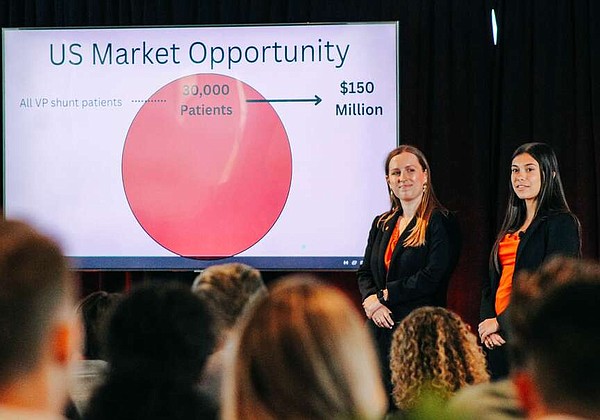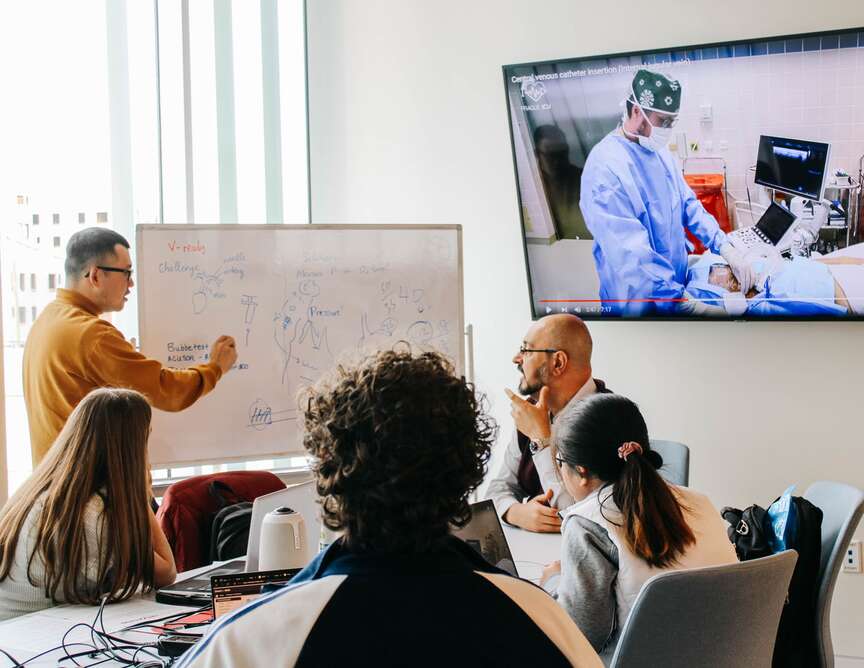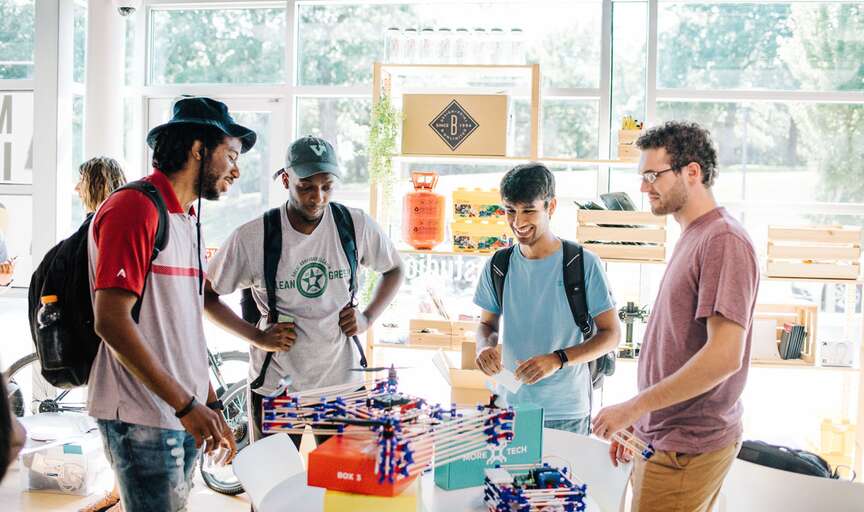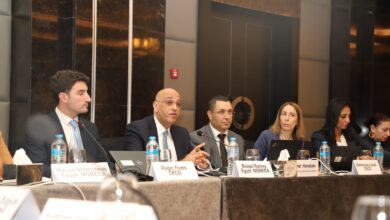One dozen startups from across the U.S. compete for crucial cash prize at the Startup Expo April 13; public invited to vote | The Arkansas Democrat-Gazette

As anyone who’s watched an episode of “Shark Tank” — or any number of similar series — knows, the concept of budding entrepreneurs vying for the advice and investment funds of seasoned business owners is an extremely appealing one.
A total of 12 entrepreneurial teams from nine universities across the country will compete for a $100,000 prize pool and business guidance while earning professional experience with a variety of pitch competitions during the University of Arkansas Heartland Challenge. It begins at the Ledger in Bentonville today and extends through Saturday. Title sponsor is the Walton Family Foundation.
The public is invited to attend and participate in the Startup Expo, the final aspect of the two and a half day event, during which each of the teams will present their business or innovation concept briefly in layman’s terms. Those attending get to cast two votes for their favorites, and the winner of that portion will be awarded $5,000 thanks to a sponsorship by Arkansas Capital Corporation.
“The Startup Expo is the lead-up to the awards ceremony for the whole Heartland Challenge,” said Deb Williams, senior director of operations and student programs for the Office of Entrepreneurship and Innovation at the University of Arkansas. The office exists outside the academic departments and creates nontraditional career opportunities for students through 15 different programs and multiple locations in Northwest Arkansas. The Startup Expo “ends up being the stress reliever; it’s fun for them to be out there talking about their businesses, (when they’ve) finished the hard part of the competition where they’ve pitched and nobody really knows who’s won anything yet, so it’s like ‘We’ll see!'”
The Office of Entrepreneurship and Innovation has hosted five such competitions, thanks to grant funding, but the dynamic has changed a lot in that time. Two were strictly virtual as they took place during the pandemic. Now it’s more public than ever.
“People come and our student population (too), it’s for people who don’t know a lot about this space, it’s an opportunity to go in and see what’s possible,” Williams said. So many people have ideas for new businesses and startups, so it can be fun to imagine a different career path or what it might look like if you acted on that idea. “It’s exposing our community to the types of businesses and work that these young adults are moving towards.”
Shock that the teams are comprised of students is a common reaction to experiencing the Startup Expo for the first time because of the high level of work and innovation at play. Williams has seen a number of students blown away at the work of peers — others in their early 20s who have built seven prototypes of their product or managed to create something that’s already generating revenue.
In one case, Williams watched Ryleigh Werner grow particularly impressed with the Heartland Challenge and Startup Expo as a freshman. She could tell that when Ryleigh saw it, she really absorbed it and internalized that students were doing incredible work. Then when Werner took finite math, something all business majors are required to take but that many of them struggle in, she knew she could capitalize on her own understanding of the subject that is given in four separate sections, none of which build on each other.
“She built out some modular training programs and decided last year to start her own business,” Williams said. Ryleigh began a tutoring business that is making money. “She’s killing it. She saw this and said ‘I could do that.'”
Now toward the end of her college experience, Werner is the director of OEI’s student advisory board.
The Startup Expo is an opportunity to see all the lessons of OEI at work in the real world, to see what others are doing and aspire to something new, Williams said, giving young entrepreneurs a certain kind of permission and empowerment to take their ideas seriously and act on them.
MEET THE TEAMS
Long before the events take place, the Office of Innovation invites teams to apply to the Heartland Challenge. There’s a circuit of these types of competitions, Williams said, at different universities around the world, and it was the dream of Carol Reeves, who was OEI executive director prior to its current leader Sarah Goforth, that the UA be able to host one of their own.
Now that Heartland Challenge has been in place for some years, it’s beginning to gain traction. Application numbers were up 40% this year compared to 2023, and from that wide net, the office narrows it down to 12 teams that get to have the three day experience in an “ecosystem (that’s) rich and strong in how we support entrepreneurs.” Before they arrive, they get matched with business ambassadors from the Northwest Arkansas region to help with their company.
This year’s contestants lean heavily toward medical device startups, said Brandon Howard, communications manager for OEI. And they come from all over — Massachusetts, New York, Iowa, Minnesota and more.
Two of the teams are from Johns Hopkins. And three of those selected for competition are from the University of Arkansas, including Hidalga Technologies, ProPika and Wanderist.
Hidalga Technologies “utilizes innovative technology to cut through the red tape of oncology care, empowering clinics to treat patients faster and more efficiently,” according to the Heartland Challenge website. Hidalga uses its eponymous software to optimize administrative workflows in healthcare, Howard said, by streamlining insurance prior authorizations through algorithmic intuition to save clinics time and money.
ProPika is a sustainable technology company that ultimately wants to produce sustainable alternative fuels and chemicals by leveraging billions of tons of agricultural waste, currently not used today, through a platform of technologies.
Wanderist will introduce an “innovative on-tap wine system, featuring smart, connected technologies that provide customers with real-time insights into pour costs and inventory data, all while upholding a commitment to sustainability and innovation,” according to the Heartland Challenge website.
When making the selections for the competing teams, Williams said each application is reviewed three times by the first round of judges. The application contains an executive summary, a recording of their elevator pitch and an additional rubric. The resulting scores determine placement, allowing them to easily determine the top dozen to invite.
During that process, “the judges are evaluating the opportunity for (the concept) to be developed into a business,” Williams said. They take a look at the product or service, how they describe what they’re selling and how competitive they are compared to others. “It’s really if they’ve addressed these areas in their executive summary and how well they’ve done that.”
Successful teams have a good handle on what their particular market is, who their competitors are, and if they have intellectual property, they should know something about how to use that to their advantage. While most any application can do that, it’s of course the ones who do it best or have the most compelling components that rise to the top of the stack.
While most of them are not to the point of generating revenue, that’s really not a big concern for judges. More important is the ability to look into the future by a few years, project their financials and determine whether it’s practical to say it will be profitable before long.
“The goal of this is ‘Would this be a good investment for a judge or an investor going into your business?'” Williams said.
TRANSFORMATION
The Heartland Challenge and its Startup Expo, while important for teams and exciting to be a part of, are in essence training experiences for students. Williams relishes that each aspect is designed to help the teams develop their skills.
Among other elements are the investor roundtables, where each team has another opportunity to present their business, this time to all venture capitalists. Students have two minutes to tell the story of their business without the use of a slide deck and not too technically — akin to meeting the investor in an airport and telling them in the brief window they might have. Afterward, judges have 15 minutes to ask follow-up questions, and it concludes with 15 minutes of genuine feedback for what the team could do better in the future.
A similar but separate elevator pitch competition is also on the schedule. So much of what OEI employs is to direct students to an exercise, then provide feedback following it to ensure growth.
“The thing that blows me away (about these events) is the evolution of the student experience,” Williams said. “When they come, they know what they’re doing, know about their business, but they’re nervous as all get out.”
It takes a lot, she said, to get up in front of people and put their hard-earned ideas out into the world. But with Heartland Challenge in particular she sees a community that invests in those people. Watching how they transform in a matter of days is rewarding. The teams often start out understandably nervous and sometimes meet problems or challenges, but they pitch nonetheless.
“Even if they don’t win their track, they still continue to grow and develop what they’re working on while they’re here,” Williams said. “The change in student teams from the beginning of the first pitch to finals, when they pitch again, can be transformational because of the feedback they get (and) the work they put in.
“It’s really fun to watch that growth.”
 Twelve teams were selected for the Heartland Challenge, where they will compete in an elevator pitch competition, investor roundtables, and the startup expo, where members of the public have the chance to vote for their favorite new business idea at the Ledger in Bentonville. The events are an extension of OEI, which helps students develop nontraditional skills to stay relevant and add value in a fast-changing economic landscape. (Photos courtesy of the University of Arkansas Office of Entrepreneurship and Innovation)
Twelve teams were selected for the Heartland Challenge, where they will compete in an elevator pitch competition, investor roundtables, and the startup expo, where members of the public have the chance to vote for their favorite new business idea at the Ledger in Bentonville. The events are an extension of OEI, which helps students develop nontraditional skills to stay relevant and add value in a fast-changing economic landscape. (Photos courtesy of the University of Arkansas Office of Entrepreneurship and Innovation) Student entrepreneurs have a variety of opportunities to earn prize money to get their ventures off the ground in this weekend’s Heartland Challenge. The competitions, hosted through the University of Arkansas Office of Entrepreneurship and Innovation, foster professional skills as they learn to explain their innovations succinctly and without too much technical information, essentially in layman’s terms. (Photo courtesy of the University of Arkansas Office of Entrepreneurship and Innovation)
Student entrepreneurs have a variety of opportunities to earn prize money to get their ventures off the ground in this weekend’s Heartland Challenge. The competitions, hosted through the University of Arkansas Office of Entrepreneurship and Innovation, foster professional skills as they learn to explain their innovations succinctly and without too much technical information, essentially in layman’s terms. (Photo courtesy of the University of Arkansas Office of Entrepreneurship and Innovation)More News


